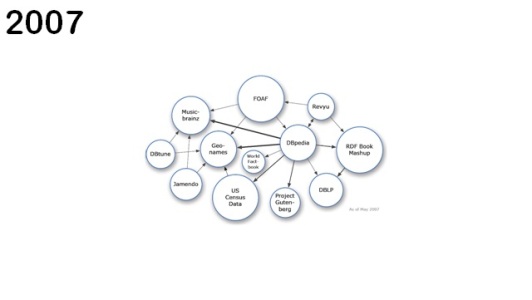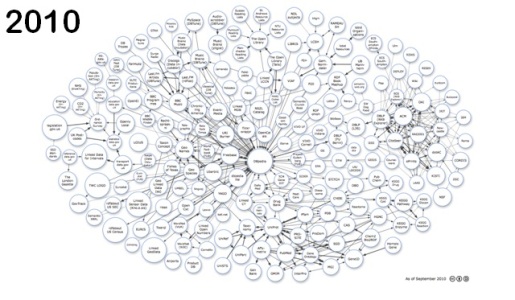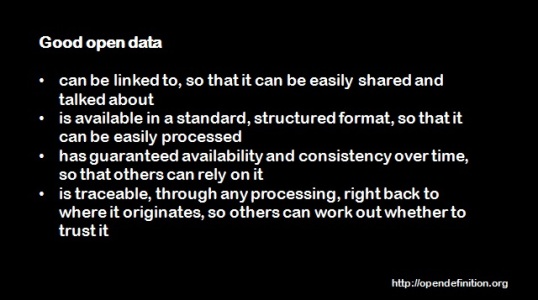Presentation made by Charles Roper at the NBN Conference 2014 and adapted for the website
25 years ago this year Tim Berners-Lee created the World Wide Web. A key design element of the web is openness and accessibility. No one company controls it and anyone with the right equipment can access information on it, and publish to it, for free. No permission required.
It's a quality we now take for granted, but it was by no means a foregone conclusion. It takes commitment to be this open.
The intervening years have brought about a knowledge revolution. The web has changed the way we work, learn, love, live, think and consume. And we're only just getting started…
We are in the midst of a data bloom. It's the raw material of the information economy. The digital building blocks of our age.
Yet, it's often difficult to find, combine and work with the cacophony of disparate data out there. But, try we must if we are to extract maximum value – maximum insight. Data in isolation, unknown or unused, is not reaching its full potential.
And so for the second decade of the web's existence, Sir Tim and the web community at large have been working on the idea of Linked Data.
Essentially, Linked Data is a way of bridging the gaps between databases on the web using common standards and identifiers so that they may be collectively mined for information and combined into ad-hoc composite data-sets – it's a powerful idea.
Over the last few years, linked databases have been burgeoning. The Linked Open Data Cloud website tracks progress:
SLIDE (LOD cloud)

? In 2007 we had just 12 linked data sets.

? As we step through the years, growth is clear, mirroring the early days of traditional web sites.
? This is the picture as of 2014. (570)

These images speak for themselves. Each node is a distinct, often vast, database. As a community dedicated to the gathering of information about our natural environment, it is essential we consider NOW how we are to become a part of this picture so that we may properly honour the importance of biodiversity to our existence.
To neglect this new chapter in the web's evolution puts us at risk of being ignored – akin to a filing cabinet full of old notebooks. Which is to say, not redundant, just very inaccessible and inconvenient and therefore easy to overlook.
The first crucial step in this process of linking our data to the global data space is to address a fundamental concern: openness. Currently, the data we generally “put out there” is not designed to be open or linked, neither technically or legally. This is a challenge we must overcome.
Thankfully we are not alone. The Open Data movement started quietly a decade ago with the intention of addressing these issues and in the last two years has exploded. Governments, NGOs, companies and citizens around the world have sat up and are paying attention and are getting involved. Minds are moving and funds are flowing.
The UK leads the way and the formation of the Open Data Institute has not only galvanised the community, but also begun to catalyse demand. Open Data is at the stage the web was at 20 years ago. It is an idea whose time has come.
A recent McKinsey report identified more than three TRILLION dollars in economic value globally through use of open data. Never mind big data, that's big money.
And so, as the title of this brief talk suggests, I passionately believe Open Data is the future of data sharing.
We do not need to open ALL data. We can start small, experiment and learn. Of course some data can and must remain proprietary, but other data we can open, bit by bit.
So as every journey starts with one step, so too must we take our first steps. The technical, legal and economic processes involved in opening data can be seen as a benchmark – a set of BEST practices – to guide our way.

Good open data is liquid. It flows. It can be linked to and talked about; it is standardised and structured; it is available and accessible; and, it is traceable to its origin.
For every project we should ask ourselves: How can we make the data open? This should be the default thought on our minds when considering ANY data initiative. It won't always be possible, but often it will, and this is what we should be striving for. This is the open way.
So if you are interested in learning more, I suggest starting with the ODI, who offer useful guides and training. You can also contact me. I'm on Twitter (@charlesroper) and email and would be delighted to discuss these ideas further. I look forward to hearing from you. Thank you.
You can watch the video of Charles giving the full presentation here and download his presentation here
